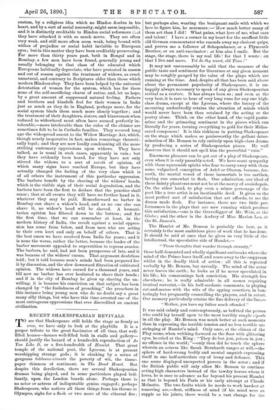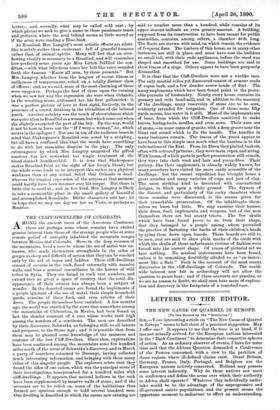RECENT SHAKESPEARIAN REVIVALS.
TO see that Shakespeare still holds the stage as firmly as ever, we have only to look at the playbills. It is a proper tribute to the great fascinator of all time, that well- filled houses—houses well-filled both in stalls and gallery— should justify the hazard of a hundredth reproduction of As You Like .1t, or a five-hundredth of Hamlet. That great temple of the national poet, the Lyceum, is at present worshipping strange gods ; it is cloaking by a series of gorgeous tableaux-vivants the poverty of wit, the tissue- paper thinness of sentiment, in The Dead Heart. But despite this dereliction, there are several Shakespearian dramas being played, and in some particulars played bril- liantly, upon the London boards alone. Perhaps there is no actor or actress of indisputable genius engaged ; perhaps Shakespeare, who notices all these things from his throne in Olympus, sighs for a flash or two more of the ethereal fire ; but perhaps also, wearing the benignant smile with which we love to figure him, he murmurs :—‘ How much better many of them act than I did! What pains, what love of me, what care and talent ! I have a corner in my heart for the snuffiest little old German commentator who emends away my choicest quips, and proves me a follower of Schopenhauer, or a Plymouth Brother, or an anti-vaccinator at him also I smile. But the stage, the stage, there is my real life ! for that I wrote : on that I live and move. Yet do thy worst, old Time ! '
It may not unreasonably be said that the measure of the public taste and sentiment for literature at any given moment may be roughly gauged by the value of the plays which are running at the time. And, despite all that has been said above about the permanent popularity of Shakespeare, it is un- happily always necessary to speak of any given Shakespearian revival as a venture. It has always been so ; and even at the very best, it is rare to hear of very long runs for any one high- class drama, except at the Lyceum, where the luxury of the mounting undoubtedly retains the attention of minds which would never have been thus retained by the acting or the poetry alone. Think, on the other hand, of the vapid panto- mime and the grimacing sentiment in the pieces which run literally for years, turning everything to gold for their Midas- eared composers ! It is this riskiness in putting Shakespeare on the stage which makes so praiseworthy the gallant deter- mination of Mr. Benson to rely entirely upon high-class drama by producing a series of Shakespearian pieces. He well deserves that it should not spell him the proverbial "ruin."
Enormous pleasure can be got out of a play of Shakespeare, even when it is only passably acted. We have scant sympathy with those squeamish spirits who fear to carry away with them some vulgarised conception of Ariel or Oberon, because, for- sooth, the mortal vessel of these immortals is too earthen, having run somewhat to flesh. Our admiration, our ideal of these dainty phantoms must not be at the mercy of avoirdupois. On the other hand, to play even a minor personage of the poet like a true artist is an inestimable deed. It gives us the most perfect sort of satisfaction that art affords, to see the dream made flesh. For instance, there are two little per- formances in the plays that are now running which produce this satisfaction,—one is the Gravedigger of Mr. Weir, at the Globe ; and the other is the Audrey of Miss Marion Lea, at the St. James's.
The Hamlet of Mr. Benson is probably the best, as it certainly is the most ambitious piece of work that he has done. It should be said at once that he gives us very little of the intellectual, the speculative side of Hamlet,— " Those thoughts that wander through eternity," those half-demented and wholly significant outbreaks where the mind of the Prince loses itself, and soars away to the empyrean whilst in the deadly thick of action : all this is repeated verbally by Mr. Benson, but unreally. The mind of the actor never leaves the earth ; he looks as if he never speculated in his life; his communings lack conviction. His strength lies elsewhere ; he is really admirable in all scenes requiring ironical restraint, —in his half-sardonic comments, in playing cat-and-mouse with the wits of the spying courtiers, in ban- teringly but pregnantly counselling the players, and in retort. Our memory particularly retains the fine delivery of the line,— " Mother, you have my father much offended."
It was said calmly and contemptuously, as befitted the person who could lay herself open to the most terribly simple riposte in all the play. Mr. Benson was much better at such moments than in expressing the terrible tension and no less terrible un- stringing of Hamlet's mind. Only once, at the climax of the Play scene, when writhing forward on the floor with glittering eyes, he cried at the King : "They do but jest, poison in jest ; up offence in the world; "—only then did he touch the sphere wherein an actress like Sarah Bernhardt ranges at will,—the sphere of hard-wrung bodily and mental anguish expressing itself in one half-articulate cry of irony and defiance. This one scene displayed unexpected powers in the actor ; and if the British public will only allow Mr. Benson to continue acting high characters instead of the tawdry heroes whom it loves, he is sure to advance as far beyond his present Hamlet as that is beyond his Paris or his early attempt at Claude Melnotte. The two faults which he needs to work hardest at removing are,—first, stiffness of mind (if him mind were as supple as his joints, there would be a vast change for the
better); and, secondly, what may be called cold rant ; by which phrase we seek to give a name to those passionate tones and gestures, where the soul behind seems as little moved as if the actor were reading a Blue-book.
As Rosalind, Mrs. Langtry's most artistic effects are silent. She is subtle rather than exuberant : full of graceful humour rather than of animal spirits. Many will feel that an over- flowing vitality is necessary to a Rosalind, and will remember how perfectly some years ago Miss Litton fulfilled the con- clition,—with what infectious tones her bell-like voice sounded forth the famous "Know all men, by these presents." But Mrs. Langtry, whether from the languor of recent illness or unlikeness of temperament, relied on a totally distinct class of effects ; and, as we said, some of the most charming of these were unspoken. Perhaps the best of them upon the evening when we saw her was the expression she wore when Orlando, in the wrestling scene, addressed her his first gallantries : it was a perfect picture of love at first sight, furtively, in the presence of a crowd, drinking in the trivialities of the beloved youth. Another subtlety was the touch of shrewishness which was quite alien to Rosalind as a woman, but which came out when she slightly overacted the part of the boy. By-the-way, would it not be best to leave out the "If I were a woman," &c , which occurs in the epilogue ? Not one in ten of the audience bears in mind that Shakespeare's Rosalind was acted by a stripling ; but all have a confused idea that the words have something to do with her masculine disguise in the play. The only extravagance by which Mrs. Langtry suggested the gifted -amateur was her somewhat too tragic treatment of the -blood-stained handkerchief. It is true that Shakespeare makes Rosalind faint at the sight of her lover's blood ; but the whole scene leads us to interpret this rather as a physical weakness than as any actual belief that Orlando is dead : whereas the tragical expression of the actress at that moment could hardly have been intenser over his corpse. But there is little else to cavil at ; and in her kind, Mrs. Langtry is likely to take a memorable place in the small gallery of beautiful and accomplished Rosalinds. Blithe characters suit her ; let us hope that we may one day see her as Viola, or perhaps as Beatrice.



































 Previous page
Previous page